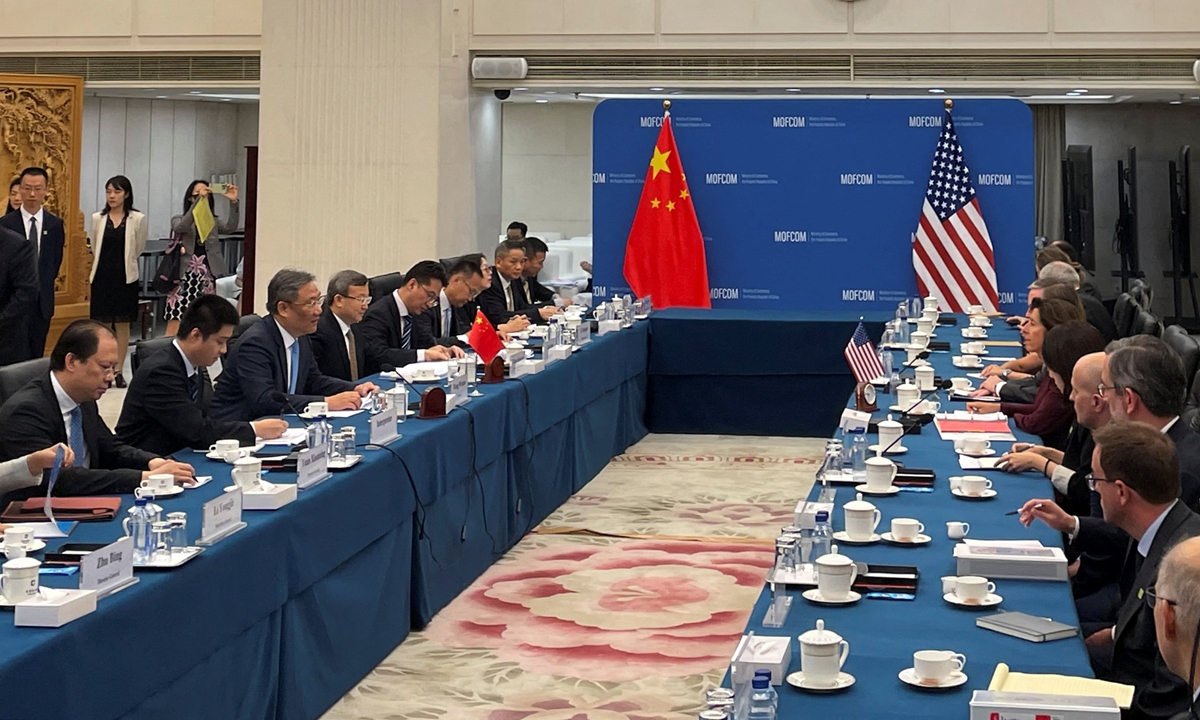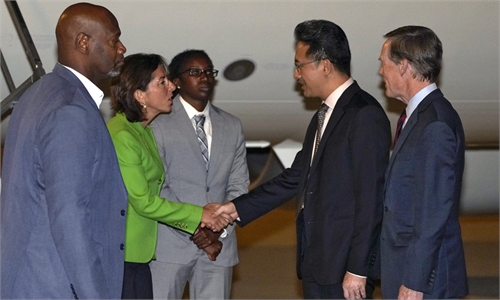
In a late-night statement, the Chinese Commerce Ministry (MOFCOM) said Wang also raised serious concerns about various US policies toward China such as Section 301 tariffs, semiconductor policies, restrictions on investments and sanctions on Chinese firms, stressing that overstretching the concept of national security is not conducive to bilateral trade.
Establishment of the new communication mechanisms showed both sides are taking necessary measures to enhance talks to address disputes; however, concrete actions by Washington to address China’s core concerns over crackdown measures are needed for a stable bilateral economic and trade relationship, experts said.
Even though major differences between the two countries will remain, efforts to stabilize bilateral economic and trade ties and enhance cooperation in areas of common interests could help the US tackle its own economic challenges, including high inflation and lingering recessionary pressure, as the Chinese economy remains resilient thanks to a series of measures to stabilize growth, experts noted.
Closely watched talks
Wang met with Raimondo on Monday morning, China Media Group reported. Video footage of the two commerce chiefs, who were both smiling and appeared to be in a positive mood, accompanied by other officials, walking into a meeting room, was broadcast by several news outlets.
According to the MOFCOM statement, Wang said economic and trade ties are the ballast stone for China-US relations and China is willing to work with the US based on the principle of mutual respect, peaceful coexistence and win-win cooperation to provide favorable policy environment for the businesses in both countries and promote bilateral trade and investment.
Raimondo also said that “it is profoundly important that we have a stable economic relationship, which is to the benefit of both of our countries. And in fact, what the world expects of us,” CNN reported on Monday. In a statement, the US Commerce Department also said that Raimondo emphasized the importance of ensuring open lines of communication.
Notably, the two sides announced to establish new communication channels between the commerce authorities of the two countries, including a working group consisting of Chinese and US officials and business representatives to seek solutions on specific commercial issues, according to the MOFCOM. The two commerce chiefs also agreed to communicate regularly and meet at least once every year. The two sides also launched a communication mechanism for export controls, and agreed to carry out technical consultations between experts from the two countries on enhancing the protection of trade secrets and confidential business information during administrative licensing procedures.
Bai Ming, deputy director of the international market research institute at the Chinese Academy of International Trade and Economic Cooperation, said the mechanisms are mostly procedural items for enhancing communication on the issues, which are necessary but concrete actions from the US are crucial for a stable China-US economic and trade relationship.
“The hope is that the US side will actually show real sincerity and address these issues, because just having more talks on the issues is far from enough,” Bai told the Global Times on Monday.
Raimondo’s remarks about commitment to promoting trade with China reflect her hope for the trip to enhance communication and stabilize China-US economic and trade relations, and address specific issues that hinder development of bilateral economic and trade ties, said Wu Xinbo, director of the Center for American Studies at Fudan University.
Underscoring her intention to promote certain trade, Raimondo, at an event on Monday, showcased some US personal care products and insisted that 99 percent of trade between China and the US is unrelated to the US’ export controls and trade of products without “national security implications” can flourish, Reuters reported on Monday. “The plan, and the hope, is that our commercial relationship, if done right, can stabilize the political relationship,” Reuters quoted Raimondo as saying.
The US commerce secretary’s showcase of US personal care products also comes as Chinese consumers are increasingly resistant toward Japanese cosmetic products over Japan’s plan to dump nuclear-contaminated wastewater into the sea.
Gao Lingyun, a trade expert at the Chinese Academy of Social Sciences in Beijing, said that there are normal communication mechanisms between the two countries and in fact there are also such mechanisms under the phrase one trade agreement.
The new working mechanisms could be set up between the Bureau of Industry and Security under the US Commerce Department and relevant departments of the Chinese Commerce Ministry to “communicate about the US’ so-called ‘entity list’ and other restrictions,” Gao told the Global Times on Monday.
Wu also said that during Raimondo’s trip, the two sides might establish relevant mechanisms to “handle specific issues such as tariffs and the US’ export restrictions targeting China.”
Still, Chinese experts cautioned against having too much expectations from the US. While the US appears increasingly intent on stabilizing economic and trade ties with China, economic and trade issues will serve the US’ overall strategy toward China, under which Washington focuses mainly on restrictions, while developing ties with China comes in second, Wu said. “Thus, they are selectively promoting improvement and development of China-US economic and trade relations. We cannot have too much expectations for the US.”
Highlighting such a strategy, Raimondo, even as she sought to promote trade between the two countries, said during the meeting on Monday that “in matters of national security, there is no room to compromise or negotiate,” according to the Financial Times.
However, even as all countries, including China, understandably take various measures to protect their own national security, the US overstretching the concept of “national security” could be the root cause of profound differences, Chinese experts said. Chinese officials have also repeatedly criticized the US for using an overstretched concept of national security to crack down on China.
“If the concept of ‘national security’ referred to by the US is reasonable, we agree with it and there is a lot of room for bilateral cooperation; however, if the US considers China’s chip industry and sovereignty and rights in the South China Sea as impacting US’ ‘national security,’ then we have a big dispute,” Gao said.
Li Yong, a senior research fellow at the China Association of International Trade, also told the Global Times on Monday that Raimondo needs to offer “a clearer and groundbreaking interpretation of ‘healthy competition,’” so as to send a more sincere message of cooperation.
Benefit for the US
The US and the world need cooperation instead of decoupling between the world’s two biggest economies, especially amid growing downward pressure, experts said.
US officials’ intensifying efforts to stabilize economic and trade ties with China come as the US economy faces a series of challenges, including persistently high inflation and lingering recessionary risks. Recently, US Fed officials warned of “significant” risks to inflation, which potentially requires more rate hikes, which in turn measures greater pressure on not just the US economy but also the global economy as a whole.
Tian Yun, a Beijing-based economist, said even though the US still seeks to contain China, US officials are also fully aware that they need China to help boost the US’ domestic economy, which is crucial for US officials ahead of elections next year. “They need better economic figures, and for that, they need to stabilize ties with China, in terms of economy and trade,” Tian told the Global Times, while noting that the Chinese economy, while facing challenges, is resilient and an irreplaceable partner for the US.
Some foreign media outlets have been hyping grim outlooks for the Chinese economy amid some challenges, but Chinese policymakers have moved swiftly to tackle various challenges in areas such as the private economy, consumption and the capital market to boost growth, which is expected to be the fastest among major economies. According to the IMF, China’ s economy is expected to grow by 5.2 percent in 2023, while the US GDP is projected to grow by 1.8 percent this year.
Raimondo also highlighted the importance of the bilateral economic relationship, which she said is “one of the most significant in the world,” on Monday. “We share over $700 billion of trade,” she said, according to CNN.
Cooperation between China and the US, which is expected to contribute to more than 50 percent of global growth, is also great news for the global economy amid the current downturn, experts said.


